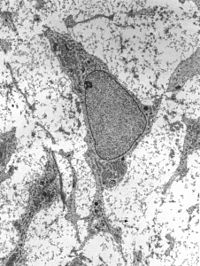
Photo from wikipedia
Little is known about the molecular players driving proliferation of neural progenitor cells (NPCs) during embryonic mouse development. Here, we demonstrate that proliferation of NPCs in the developing forebrain depends… Click to show full abstract
Little is known about the molecular players driving proliferation of neural progenitor cells (NPCs) during embryonic mouse development. Here, we demonstrate that proliferation of NPCs in the developing forebrain depends on a particular combination of cell cycle regulators. We have analyzed the requirements for members of the cyclin‐dependent kinase (cdk) family using cdk‐deficient mice. In the absence of either cdk4 or cdk6, which are both regulators of the G1 phase of the cell cycle, we found no significant effects on the proliferation rate of cortical progenitor cells. However, concomitant loss of cdk4 and cdk6 led to a drastic decrease in the proliferation rate of NPCs, specifically the basal progenitor cells of both the dorsal and ventral forebrain at embryonic day 13.5 (E13.5). Moreover, basal progenitors in the forebrain of Cdk4;Cdk6 double mutant mice exhibited altered cell cycle characteristics. Cdk4;cdk6 deficiency led to an increase in cell cycle length and cell cycle exit of mutant basal progenitor cells in comparison to controls. In contrast, concomitant ablation of cdk2 and cdk6 had no effect on the proliferation of NCPs. Together, our data demonstrate that the expansion of the basal progenitor pool in the developing telencephalon is dependent on the presence of distinct combinations of cdk molecules. Our results provide further evidence for differences in the regulation of proliferation between apical and basal progenitors during cortical development. © 2018 Wiley Periodicals, Inc. Develop Neurobiol 78: 660–670, 2018
Journal Title: Developmental Neurobiology
Year Published: 2018
Link to full text (if available)
Share on Social Media: Sign Up to like & get
recommendations!